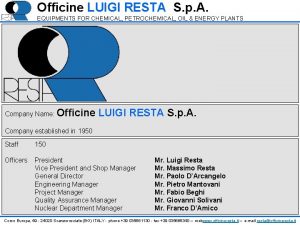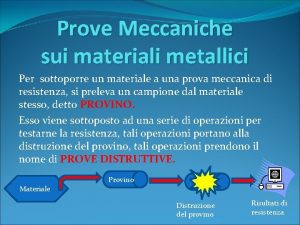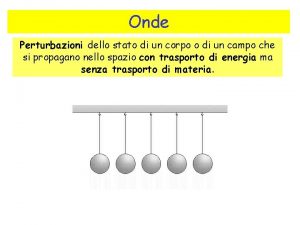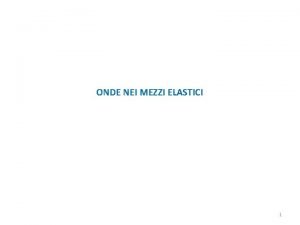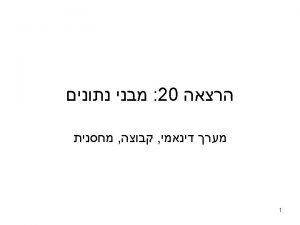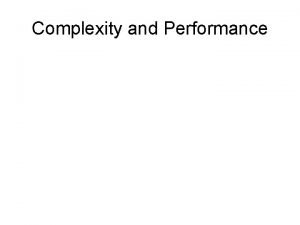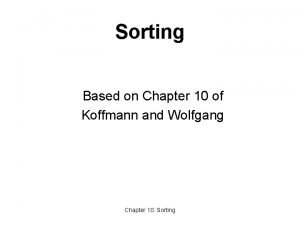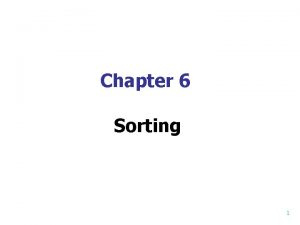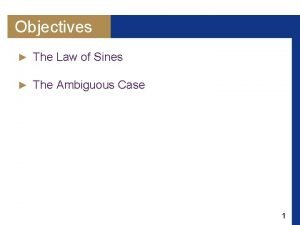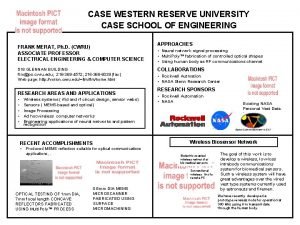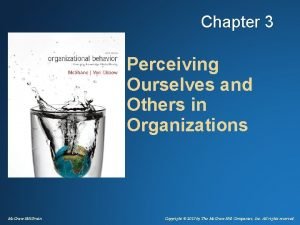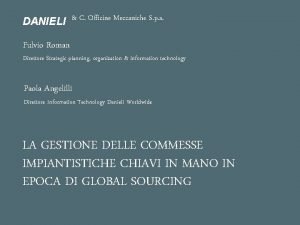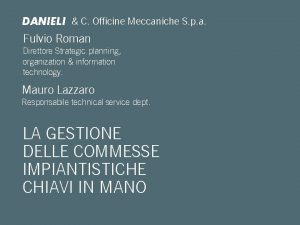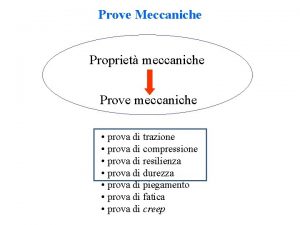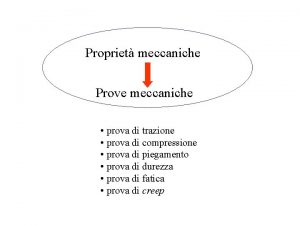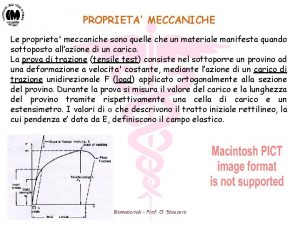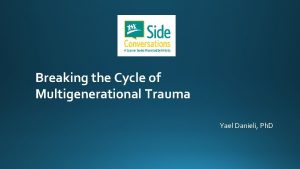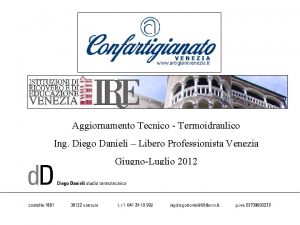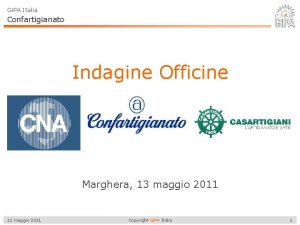Case C1817 Danieli C Officine Meccaniche and Others






![Are Articles 56 and 57 TFEU, Directive [96/71], [and Chapter 2, Free movement of Are Articles 56 and 57 TFEU, Directive [96/71], [and Chapter 2, Free movement of](https://slidetodoc.com/presentation_image_h2/100301ff7e436f41ba306f31cea66a56/image-7.jpg)















- Slides: 22

Case C-18/17 Danieli & C. Officine Meccaniche and Others

Judgment of the Court (Third Chamber) of 14 November 2018 Main proceedings Danieli & C. Officine Meccaniche Sp. A Dragan Panic Ivan Arnautov Jakov Mandic Miroslav Brnjac Nicolai Dorassevitch Alen Mihovic joined party: Arbeitsmarktservice Leoben (Leoben regional office of the employment market service, Austria) (Request for a preliminary ruling from the Verwaltungsgerichtshof (Supreme Administrative Court, Austria))

4 Croatian nationals Russian national Belorussian national

• Danieli & C Officine Meccaniche Sp. A is an Italy-based company primarily engaged in industrial sector. It designs, manufactures, sales and makes installation of machines and plants for the metallurgical industry. Its portfolio includes mines; pellet production plants; machinery for the treatment of scrap metal; steelworks for production of liquid steel; continuous casting machinery for blooms; rolling mills for long products • It is part of the group of companies including Danieli Systec d. o. o. established in Croatia and Danieli Automation -S. p. A. established in Italy. • It accepted a contract from an Austrian undertaking for the construction of a wire-rod mill in Austria. • Danieli wished to deploy four Croatian nationals, who are employed by the Croatian employer and have social security cover in Croatia. It also wished to deploy two third-country nationals, a Russian and a Belarussian, who are employed by the Italian employer and have social security cover in Italy.

• The workers concerned are not directly employed by Danieli, but by other undertakings belonging to the same group of undertakings: while the Croatian nationals have an employment contract with the Croatian employer and have social security cover in Croatia, the third-country nationals have an employment contract with the Italian employer and have social security cover in Italy. • It can be seen from the order for reference that Danieli had specified that the workers in question were not employed by Danieli, but would be transferred to it by, respectively, the Croatian employer and the Italian employer in order for it to complete the project in Austria. • The workers were to be transferred to Danieli so that undertaking could complete the construction of a wire-rod mill in Austria, a construction project for which Danieli appears to be the principal contractor. During their secondment in Austria, the workers were to perform their tasks under the direction of Danieli. Moreover, it can be understood from the order for reference that the workers have not worked for Danieli in Italy, but have been transferred directly to Austria by their employers. In other words, the Croatian nationals have not been active on the labour market in Italy. The third-country nationals, on the other hand, are legally employed in Italy where they habitually work for the Italian employer.

THE LEOBEN REGIONAL OFFICE OF THE EMPLOYMENT MARKET SERVICE REJECTED 18 January 2016, Danieli registered the abovementioned workers with the competent authority and applied for the confirmation of EU postings without a work permit in relation to them. Appeals were subsequently brought against that decision before the Verwaltungsgerichtshof (Supreme Administrative Court, Austria) that decided to stay the proceedings and to refer the following questions to the Court for a preliminary ruling: the applications for confirmation of the posting of foreign nationals within the EEA in accordance with Paragraph 18(12) of the Law on the employment of foreign nationals and prohibited the posting. Appeals were subsequently lodged against that decision were dismissed by the Bundesverwaltungsgericht (Federal Administrative Court, Austria) as unfounded. According to that court, the postings fell outside the scope of Directive 96/71. In that court’s view, the directive was not applicable, given that no employment relationship existed between Danieli and the workers it wished to deploy for carrying out the project in Austria.
![Are Articles 56 and 57 TFEU Directive 9671 and Chapter 2 Free movement of Are Articles 56 and 57 TFEU, Directive [96/71], [and Chapter 2, Free movement of](https://slidetodoc.com/presentation_image_h2/100301ff7e436f41ba306f31cea66a56/image-7.jpg)
Are Articles 56 and 57 TFEU, Directive [96/71], [and Chapter 2, Free movement of persons, paragraphs 2 and 12], of Annex V to the [2012 Act of Accession], to be interpreted as meaning that Austria is entitled to require workers transferred to an Italian undertaking that provides a service in Austria to have a work permit when those workers are Croatian nationals employed by a Croatian undertaking and there is no employment relationship between them and the Italian undertaking? Are Articles 56 and 57 TFEU and Directive [96/71] to be interpreted as meaning that Austria is entitled to restrict the posting of Russian and Belarussian workers legally employed in an undertaking established in Italy by requiring a work permit and there is no employment relationship between them and the second undertaking?

The legal framework EU LAW Article 56 Within the framework of the provisions set out below, restrictions on freedom to provide services within the Union shall be prohibited in respect of nationals of Member States who are established in a Member State other than that of the person for whom the services are intended. […] Article 57 Services shall be considered to be "services" within the meaning of the Treaties where they are normally provided for remuneration, in so far as they are not governed by the provisions relating to freedom of movement for goods, capital and persons. […] Without prejudice to the provisions of the Chapter relating to the right of establishment, the person providing a service may, in order to do so, temporarily pursue his activity in the Member State where the service is provided, under the same conditions as are imposed by that State on its own nationals.

The 2012 Act of Accession Annex V to the 2012 Act of Accession is entitled ‘List referred to in Article 18 of the Act of Accession: transitional measures’. Chapter 2 thereof deals with transitional measures relating to free movement of persons. It states: 1. Article 45 and the first paragraph of Article 56 of the TFEU shall fully apply only, in relation to the freedom of movement of workers and the freedom to provide services involving temporary movement of workers as defined in Article 1 of Directive 96/71/EC, between Croatia on the one hand, and each of the [existing] Member States on the other hand, subject to the transitional provisions laid down in paragraphs 2 to 13. 2. By way of derogation from Articles 1 to 6 of Regulation (EU) No 492/2011 and until the end of the two year period following the date of accession, the [existing] Member States will apply national measures, or those resulting from bilateral agreements, regulating access to their labour markets by Croatian nationals. The [existing] Member States may continue to apply such measures until the end of the five year period following the date of accession. 12. In order to address serious disturbances or the threat thereof in specific sensitive service sectors in the labour markets of Germany and Austria, which could arise in certain regions from the transnational provision of services, as defined in Article 1 of Directive 96/71/EC, and as long as they apply by virtue of the transitional provisions laid down above, national measures or those resulting from bilateral agreements on the free movement of Croatian workers, Germany and Austria may, after notifying the Commission, derogate from the first paragraph of Article 56 of the TFEU with a view to limiting in the context of the provision of services by companies established in Croatia, the temporary movement of workers whose right to take up work in Germany and Austria is subject to national measures. ’

• Work permit amounts a restriction laid down in art 56 and 57 TFUE. • BUT as concerns specifically Croatian nationals there are the special rules that the legislature has enacted that limit, during a transitional period after the accession to the European Union. • By dint of paragraph 2, a Member State may restrict the free movement of Croatian workers by applying national measures in order to avoid such disturbances due to the immediate arrival of a large number of workers who are nationals of those new States; so the transitional provisions allow Member States to restrict the movement of workers from new Member States.

National law 9. Paragraph 18 of the Ausländerbeschäftigungsgesetz (Law on the employment of foreign nationals) (4) provides: ‘Posted foreign nationals Conditions for employment; posting permit (1) For foreign nationals who are employed by a foreign employer that is not established in Austria a work permit is required, unless otherwise provided below. If such work does not exceed six months, foreign nationals require a posting permit, which may be granted for a period not exceeding four months. . (12) Foreign nationals who are posted to Austria by an undertaking established in another Member State of the European Economic Area for the purposes of the temporary performance of work do not require a work permit or a posting permit if: 1. They are duly authorised, for a period exceeding the length of posting in Austria, to work in the State where the place of business is established and they are legally employed in the undertaking which posts them, and if 2. The Austrian pay and work conditions … and the legal provisions relating to insurance for social security are complied with. The central coordination office for the control of illegal employment … of the Federal Ministry of Finance must … forward immediately to the competent regional employment office a notification of the employment of foreign nationals posted to work in Austria. Following notification, the regional employment office must inform the undertaking and the employer using the services that, either, all requirements have been complied with (“EU-Posting Confirmation”), or to refuse the posting if those requirements have not been fulfilled. . . ’ Paragraph 32 a of the Law on the employment of foreign nationals regarding transitional provisions on EU enlargement states: ‘(1) Nationals of the Member States of the European Union which acceded to the European Union on 1 January 2007, on the basis of the Treaty concerning the accession of the Republic of Bulgaria and Romania to the European Union … do not enjoy free movement for workers … unless they are relatives of a citizen of another EEA Member State with a legal right to reside under EU law …). . (11) On the basis of [the 2012 Act of Accession], section 1 to section 9 apply mutatis mutandis as of the accession of the Republic of Croatia for citizens of the Republic of Croatia and for employers established in the Republic of Croatia. ’

• In Austria, foreign nationals employed by a foreign employer not established in Austria must have a work permit. • However, in the case of what are known as EU postings, that is to say, when the foreign nationals are posted to Austria by an undertaking established in another (EEA) Member State in order to perform temporary work, that requirement does not apply. That is so provided that those workers are, among other things, duly authorized, for a period exceeding the length of posting in Austria, to work in the State where the place of business is established and that they are legally employed in the undertaking which posts them. • During a transitional period which ends on 30 June 2018, a work permit is however required for Croatian nationals in accordance with the relevant national rules (Paragraphs 18 and 32 a of the Law on the employment of foreign nationals).

Directive 96/71/EC (3) 6. Directive 96/71 lays down the rules governing the posting of workers in the context of the provision of services. 7. Article 1 defines the scope of the directive. It reads: ‘(1) This Directive shall apply to undertakings established in a Member State which, in the framework of the transnational provision of services, post workers, in accordance with paragraph 3, to the territory of a Member State. (3) This Directive shall apply to the extent that the undertakings referred to in paragraph 1 take one of the following transnational measures: (a) post workers to the territory of a Member State on their account and under their direction, under a contract concluded between the undertaking making the posting and the party for whom the services are intended, operating in that Member State, provided there is an employment relationship between the undertaking making the posting and the worker during the period of posting; or (b) post workers to an establishment or to an undertaking owned by the group in the territory of a Member State, provided there is an employment relationship between the undertaking making the posting and the worker during the period of posting; or (c) being a temporary employment undertaking or placement agency, hire out a worker to a user undertaking established or operating in the territory of a Member State, provided there is an employment relationship between the temporary employment undertaking or placement agency and the worker during the period of posting. ’

In the opinion of General Advocate delivered on 26 april 2018: • on the one hand the Directive 96/71, by contrast, is of no direct significance in this question because it is designed to protect workers by affording posted workers certain minimum rights in the particular context of the cross-border provision of services to avoid "social dumping“ • Nevertheless Directive 96/71 is relevant for the resolution of the present case for other reasons. In fact, as will be illustrated in more detail below, the Court’s case-law draws a distinction between different types of posting: v. Traditional posting (Article 1(3)a): an undertaking that provides a service in the host Member State does so by posting its own workers to the host Member State. v. Making manpower available to another undertaking (Article 1(3)c): a temporary employment undertaking or placement agency hires out a worker to a user undertaking established or operating in the territory of a Member State, provided there is an employment relationship between the temporary employment undertaking or placement agency and the worker during the period of posting.

• More specifically, workers transferred to the host Member State, be it in the context of traditional posting or the making available of manpower, fall within the scope of the directive. • However, it is settled case-law that, in contrast to workers posted by their employer within the meaning of Article 1(3)(a) of the directive, workers transferred to the host Member State within the meaning of Article 1(3)(c) constitutes a form of access to the labour market of that host Member State. • Particular relevance here is Article 1(3)(c).

CONDITIONS 1 The hiring out of manpower is a service provided for remuneration in respect of which the worker who has been hired out remains in the employ of the undertaking providing the service and no contract of employment has been entered into with the user undertaking 2 the hiring out is characterized by the fact that the movement of the worker to the host Member State constitutes the very purpose of the provision of services effected by the undertaking providing the services 3 The worker carries out his tasks under the control and direction of the user undertaking.

4 Croatian nationals Russian national Belorussian national

The Croatian and thirdcountry workers remain employed by the undertakings seconding them to Austria, that is, the Croatian and Italian employers The movement of the workers to Austria constitutes the very purpose of the arrangement between Danieli and the Croatian and Italian employers. While transferred to Austria, the workers are to carry out their tasks under the control and direction of the user undertaking, that is to say, Danieli

The first question referred AFFIRMATIVE • Act of Accession, Chapter 2, paragraph 2, of Annex V to the 2012 Act of Accession regulates the access of Croatian workers to the labour market of other Member States during a transitional period • As the Court has made clear, it would be artificial to draw a distinction with regard to the influx of workers onto the labour market of a Member State depending on whether they gain access to it through hiring out or directly and independently. • it would be equally artificial to draw a distinction between a situation where an Austrian undertaking wishes to use Croatian workers hired out from the Croatian employer and a situation where, as here, the user undertaking wishing to provide a service in Austria is established in another Member State. • the Croatian nationals are assigned, during the period for which they are made available, to a post in Austria under the direction of Danieli, a post which could have been occupied, at least potentially, by a person employed by that undertaking in Austria. • Article 1(3)(c) of Directive 96/71 constitutes a form of access to the labour market of that host Member State Work permit is justified by the transitional period characterized by an increased risk of immediate and substantial disruption of the labour market of the host Member State.

UNDERTAKING WORKERS UUSER UNDERTAKING


The second question NEGATIVE • Article 56 TFEU • Transitional period • But The third-country nationals concerned are legally employed in their Member State of residence to which they return after the work in the host Member State is completed • So they do not purport to gain access to the labour market of that second State, as they return, in principle, to their country of origin or residence after the completion of their work. • the Court has generally considered requirements that go beyond a simple prior declaration disproportionate in the light of the objectives of guaranteeing, the stability of the labour market in the host Member State Additional requirements imposed by the host Member State would considerably hamper the freedom of undertakings to provide a service in the host Member State In any event, the Court has accepted that Member States may require information from the service-providing undertaking showing that the situation of the workers concerned is lawful as regards matters such as residence, work permit and social coverage in the Member State in which those workers are employed.
 Livia danieli
Livia danieli Danieli leoben
Danieli leoben Breech lock heat exchanger
Breech lock heat exchanger Prove meccaniche sui materiali
Prove meccaniche sui materiali Onde meccaniche esempi
Onde meccaniche esempi Onde meccaniche
Onde meccaniche Best worst and average case
Best worst and average case Long case and short case
Long case and short case Binary search algorithm average complexity
Binary search algorithm average complexity Bubble sort best case and worst case
Bubble sort best case and worst case Bubble sort best case and worst case
Bubble sort best case and worst case Bubble sort best case and worst case
Bubble sort best case and worst case How to solve ambiguous case triangles
How to solve ambiguous case triangles Vary preposition
Vary preposition Case western reserve university case school of engineering
Case western reserve university case school of engineering Project failure case study
Project failure case study Rostow stages
Rostow stages Why are some countries rich and others poor
Why are some countries rich and others poor Elastic vs inelastic collision
Elastic vs inelastic collision Perceiving ourselves and others in organizations
Perceiving ourselves and others in organizations Types of characters
Types of characters The person and others
The person and others Chapter 6 lesson 2 respecting yourself and others
Chapter 6 lesson 2 respecting yourself and others


